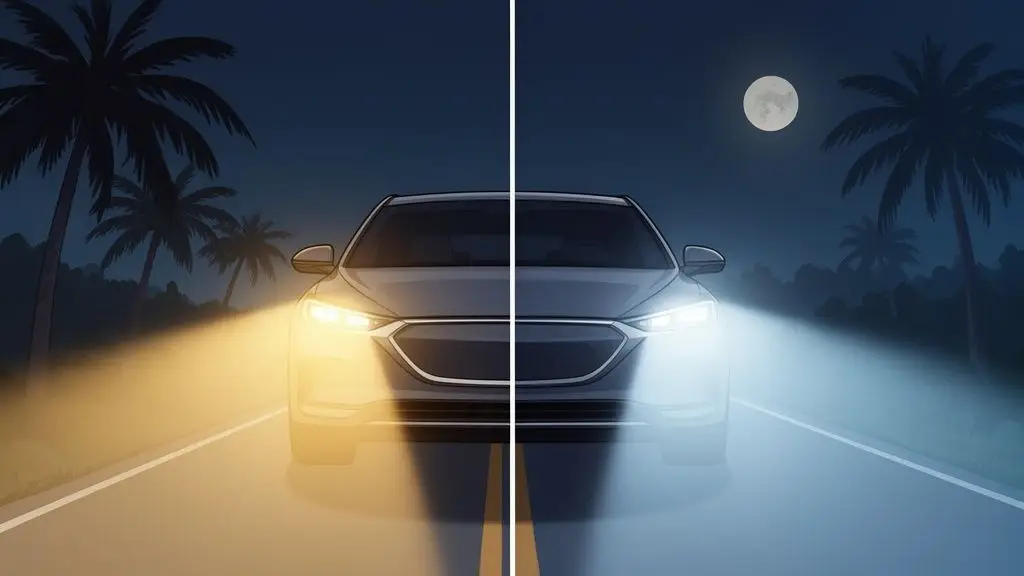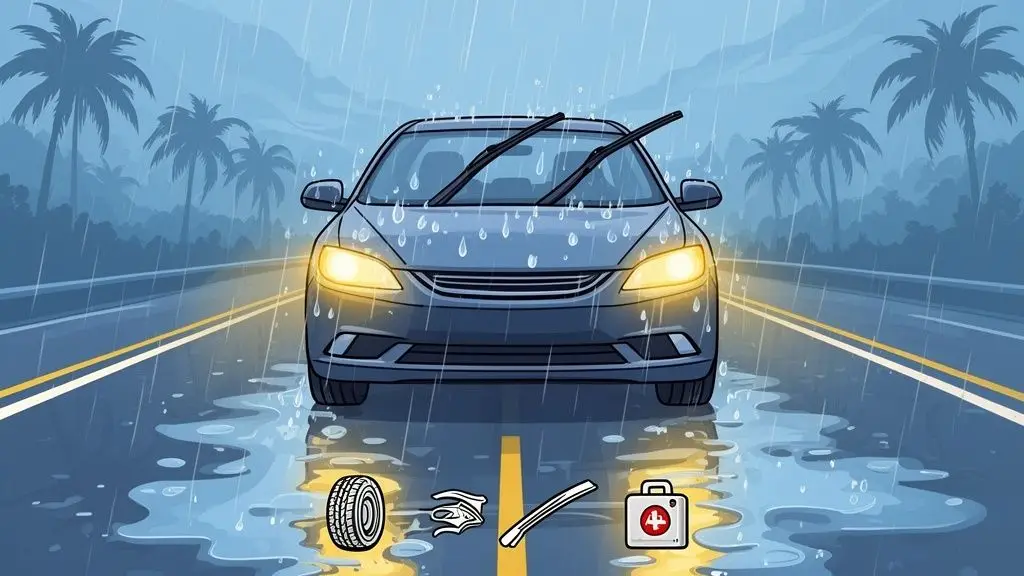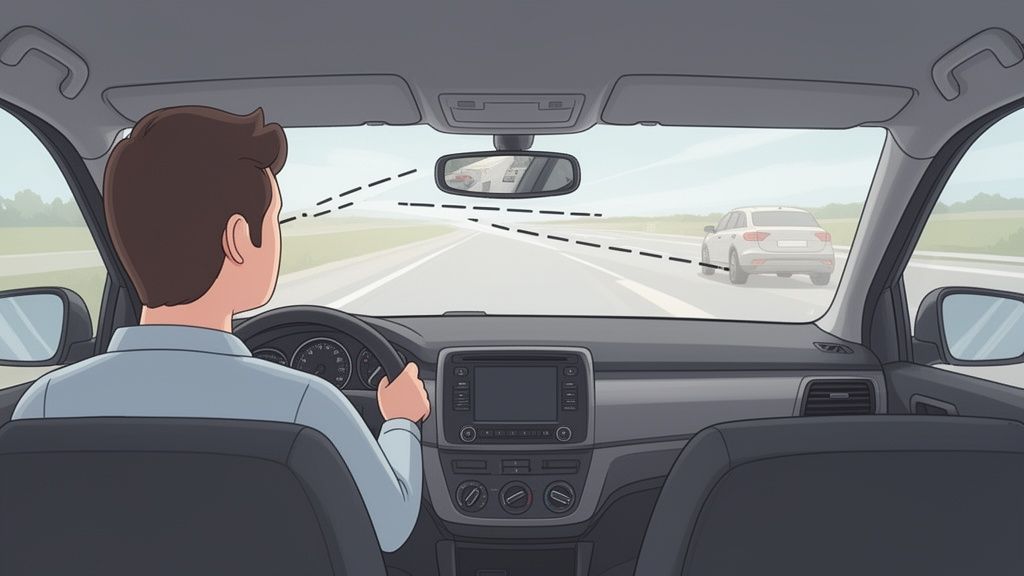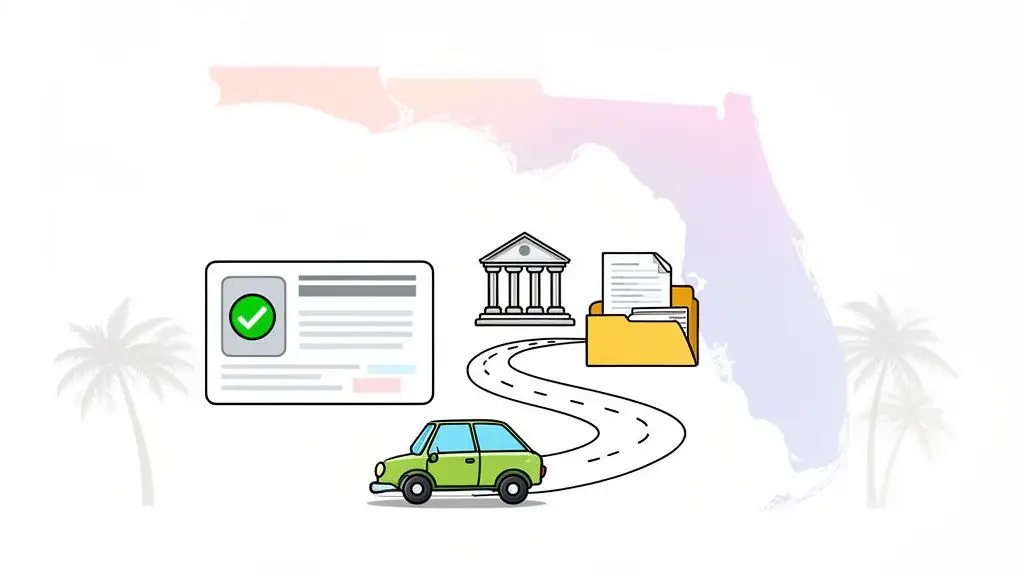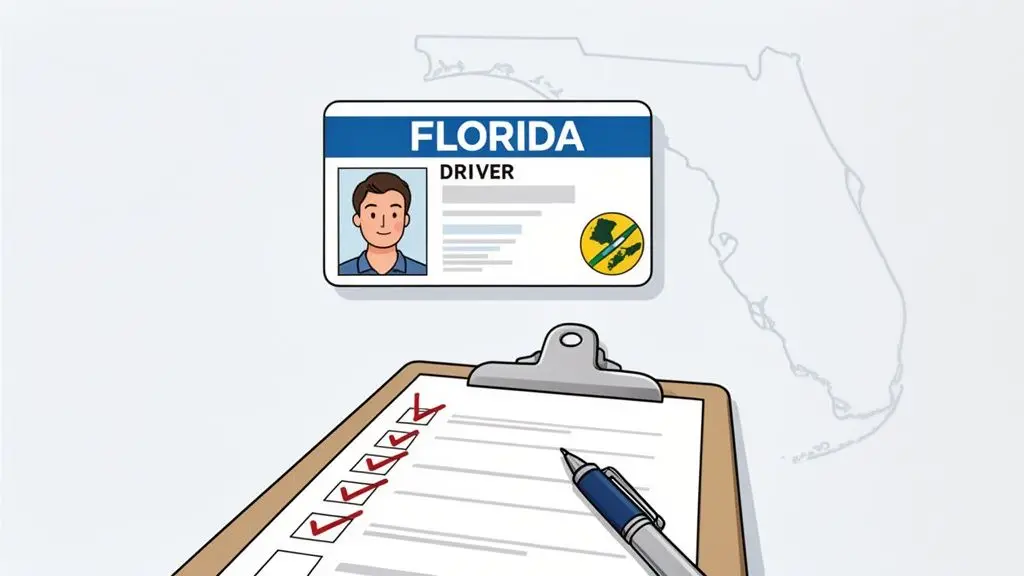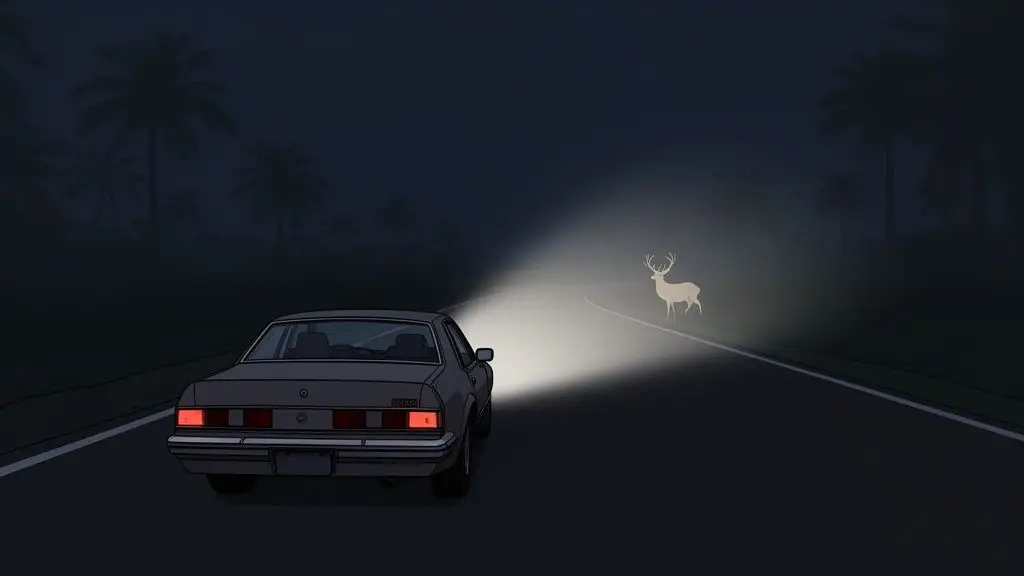When you hear the term “traffic violation,” you probably picture something like speeding or running a red light. However, there’s a whole other category of tickets you can get even when your car isn’t moving an inch. These are called non-moving violations.
Think of it this way: a non-moving violation is about your car’s condition or its legal status, not your actions behind the wheel. It’s a ticket for something wrong with the vehicle itself—whether it’s parked, or even if you’re driving but the issue isn’t related to your driving behavior. These rules exist to ensure every car is safe and legally ready for the road.
What Is a Non-Moving Violation?
Simply put, a non-moving violation is a citation for an issue that doesn’t involve the act of driving dangerously. For example, a parking ticket is a classic non-moving violation, but the term covers a lot more ground than just that.
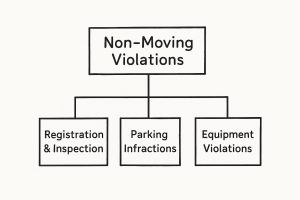
As the image shows, these tickets usually fall into a few key areas. Specifically, these include problems with the car’s paperwork (like registration), parking mistakes, or issues with the vehicle’s required equipment.
The Main Types of Non-Moving Violations
Let’s break down the common scenarios where you might get a non-moving violation ticket.
- Parking Violations: This is the big one. We’re talking about parking in a no-parking zone, overstaying your welcome at a meter, blocking a fire hydrant, or parking in a handicap spot without a permit.
- Equipment Violations: These are citations for faulty or non-compliant equipment on your vehicle. For instance, a broken taillight, a burned-out headlight, or even excessively tinted windows can get you a ticket.
- Paperwork and Documentation Issues: This category covers all the legal stuff. You can be cited for having an expired registration sticker on your license plate, not having proof of insurance in the car, or failing to display your license plates correctly.
To make the distinction crystal clear, here’s a quick rundown of how these two types of violations stack up.
Moving vs Non Moving Violations at a Glance
This quick comparison table highlights the fundamental differences between moving and non-moving traffic violations, focusing on the action, typical penalties, and impact on a driver’s record.
| Violation Type | What It Is | Common Examples | Typical Penalty |
|---|---|---|---|
| Moving Violation | An offense committed while the vehicle is in motion. | Speeding, running a red light, reckless driving, DUI. | Fines, driver’s license points, insurance increases, possible license suspension. |
| Non-Moving Violation | An offense related to the vehicle itself, not the act of driving. | Parking tickets, broken taillight, expired registration. | Usually just a fine. Typically no points and minimal impact on insurance. |
At the end of the day, non-moving violations are all about ensuring every car on the road is legally compliant and mechanically sound. These rules, often guided by standards from organizations like the National Highway Traffic Safety Administration (NHTSA), are in place to maintain order and safety for everyone. In addition, the U.S. Department of Transportation (USDOT) provides extensive resources on vehicle safety standards.
Common Types of Non-Moving Violations
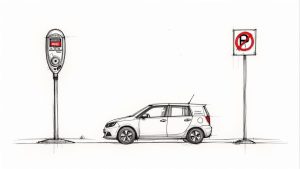
When most people think of a non-moving violation, the dreaded parking ticket is the first thing that comes to mind. While that’s certainly the most famous example, this category of infractions is actually much broader.
At its core, a non-moving violation is about your vehicle’s compliance with safety and administrative rules, not about how you’re actively driving it. You can get one while your car is parked, but an officer might also issue one during a traffic stop if they spot a problem unrelated to your driving.
Let’s break down the main types you’re likely to encounter.
Parking Violations
This is the big one. An officer can write you a ticket for all sorts of parking mistakes, especially those that create a safety hazard or just mess up the flow of traffic.
You’ve probably seen these in action:
- Expired Meter: The classic mistake of letting the meter run out of time.
- Restricted Zones: Parking in a fire lane, a “No Parking” zone, or getting too close to a fire hydrant. Keeping hydrants clear is a major safety rule for first responders.
- Permit Parking: Leaving your car in a residential or commercial spot that requires a permit you don’t have.
- Blocking Access: This is a serious one—parking in a way that blocks a driveway, crosswalk, or a handicap-accessible ramp.
Equipment Violations
These are often called “fix-it tickets” because you’re usually required to prove you’ve corrected the problem. They all come down to the mechanical and safety condition of your vehicle.
An officer might spot one of these issues during a traffic stop or even just by seeing your car parked on the street.
Common examples include:
- Broken Lights: A burned-out headlight, taillight, or brake light is an easy thing for an officer to notice.
- Cracked Windshield: A significant crack, especially one that blocks your line of sight, is a clear violation.
- Worn Tires: Driving on bald tires with tread below the legal limit is a major safety risk. According to the Federal Highway Administration (FHWA), proper tire maintenance is crucial.
- Loud Exhaust: If your exhaust system is broken or modified to be excessively loud, you can get a ticket for it.
Documentation Violations
This last category is all about the paperwork. These violations suggest your vehicle might not be legally registered or insured to be on the road in the first place.
You could get a ticket for:
- Expired Registration: Driving with an out-of-date sticker on your license plate.
- No Proof of Insurance: Not being able to show a current insurance card when an officer asks for it.
- Improperly Displayed Plates: Missing a front or rear license plate in states where both are required.
While these tickets don’t usually add points to your license, you still need to handle them quickly to avoid bigger headaches. Many state .gov websites provide official driver handbooks that detail all local roadway laws.
Fines, Penalties, and Other Consequences
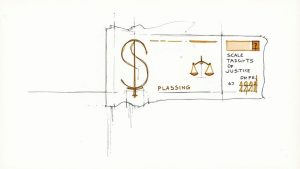
So you’ve found one of those dreaded tickets tucked under your windshield wiper. Now what? The first thing you’re hit with is a fine, and these can swing wildly from a minor annoyance for an expired meter to a much more painful penalty for parking in a fire lane.
The exact cost really boils down to your local laws. A parking ticket in a large city, for instance, is going to sting a lot more than one in a small town. And these tickets are everywhere—major cities often issue millions of them every single year.
What Happens If You Just Ignore the Ticket?
Let’s be blunt: ignoring a non-moving violation is a terrible idea. It’s like letting a small leak in your roof go unfixed—it only gets bigger and more expensive over time. If you just toss that ticket in the glove box and forget about it, a whole cascade of problems can start.
First, the city will tack on late fees, making the original fine even bigger. If you continue to ignore it, the consequences get a lot more serious.
- Collections Agency: Your unpaid ticket could be sent to a collections agency, which can put a real dent in your credit score.
- Registration Hold: The state can put a hold on your vehicle registration, preventing you from renewing it until you pay up.
- Vehicle Towing: Rack up enough unpaid tickets, and you might walk outside to find your car has been towed. Getting it back means paying all the fines plus hefty towing and storage fees.
- License Suspension: Believe it or not, some states can even suspend your driver’s license for unpaid non-moving violations.
The Deal with “Fix-It Tickets”
Sometimes, you’ll get a ticket for an equipment issue, like a broken taillight or a cracked windshield. These are often called “fix-it tickets,” and they work a little differently.
The court gives you a chance to make things right. You have to get the problem repaired and then provide proof—like a receipt from a mechanic—to the authorities by a certain deadline. Do that, and you’ll usually just have to pay a small administrative fee to have the ticket dismissed. But if you ignore it, that fix-it ticket turns into a much larger fine. The Governors Highway Safety Association (GHSA) often highlights the importance of vehicle maintenance in preventing citations and collisions.
No matter the type of violation, dealing with it quickly is always your best bet. If you find yourself with any kind of citation, it’s worth exploring your options through your local court or DMV website.
Your Driving Record and Insurance Impact
Let’s get right to it. The first question that pops into anyone’s head after getting a ticket is, “Is this going to make my insurance go up?” It’s a great question, and the answer really boils down to what kind of ticket you’re holding.
The good news? For most non-moving violations, you can breathe a little easier. A single parking ticket or a fix-it ticket for a busted tail light usually won’t add points to your driving record. Because of that, your insurance company probably won’t even find out about it, which means your rates should stay put.
Key Takeaway: At the end of the day, insurance companies care about one thing: how risky you are to insure. Moving violations like speeding scream “risk,” while non-moving violations typically don’t.
When a Small Problem Becomes a Big One
But here’s where things can get tricky. The single worst thing you can do with a non-moving violation is to simply ignore it. Those fines don’t just vanish into thin air. In fact, letting them sit can set off a chain reaction with some pretty serious consequences.
If you fail to pay up, the state won’t just forget about it. They can:
- Block you from renewing your vehicle registration.
- Hand the debt over to a collection agency, which can wreck your credit score.
- Suspend your driver’s license.
That last one is the real kicker. A suspended license is a massive red flag for any insurance provider. It immediately paints you as a high-risk driver, and insurers will often jack up your rates or, in some cases, cancel your policy altogether.
Moving Violations Are a Different Story
Now, moving violations are a completely different ballgame. Things like reckless driving, blowing through a stop sign, or speeding almost always hit your insurance premium. These violations add points directly to your license, and each point is like a little signal to your insurer that you’re more of a gamble to cover. The result? Higher premiums. The Insurance Institute for Highway Safety (IIHS) provides extensive research showing the link between moving violations and collision risk.
Knowing how different tickets can affect your policy is just smart financial planning. The best advice is always the simplest: take care of any ticket right away to protect your driving record and your wallet.
Why We Have These Traffic Laws

Ever found yourself staring at a ticket and wondering why we even have two different categories for traffic violations? It all comes down to safety and focus. As cars started filling up our roads, it became clear that not all driving mistakes were created equal. Lawmakers needed a way to separate the truly dangerous actions from the more minor administrative slip-ups.
This split between moving and non-moving violations really took shape in the 20th century. Think about the post-World War II boom when car ownership exploded. The old, simple rules just couldn’t keep up. So, a new system was born: dangerous driving that could cause a crash got hit with tougher penalties, while non-moving violations were handled with simple fines or “fix-it” tickets.
Safety First
This distinction helps law enforcement prioritize what really matters on the road. Let’s be honest, stopping a driver who’s weaving through lanes at 90 mph is a lot more urgent than ticketing someone for an expired registration sticker. Moving violations are an immediate threat to you, me, and everyone else sharing the road.
By focusing on the most serious offenses first, traffic laws directly aim to prevent crashes and save lives. It’s a practical approach backed by data from safety groups like the National Highway Traffic Safety Administration (NHTSA), which constantly analyzes crash statistics to help shape effective road rules.
So what about non-moving violations? They’re all about maintaining order and ensuring things run smoothly. That rule about not parking in front of a fire hydrant isn’t just a suggestion; it guarantees emergency crews can get to a fire when every second counts. These regulations are the background rules that help traffic flow and keep our communities safe.
State Spotlight: Florida’s “Move Over” Law
Each state has unique laws designed to improve safety. In Florida, for example, the “Move Over” Law (Florida Statute 316.126) is a critical rule that protects law enforcement and other emergency workers. According to the official Florida Highway Safety and Motor Vehicles website (FLHSMV.gov), drivers must move over a lane for stopped emergency, sanitation, or utility service vehicles. If you cannot safely move over, you must slow down to 20 mph below the speed limit. This law helps create a safer space for first responders working on the roadside.
Got Questions? We’ve Got Answers.
Let’s tackle some of the most common questions people have about non-moving violations. Getting a ticket is stressful enough, so clearing up the confusion is the first step to handling it right.
Can a non-moving violation actually get my license suspended?
Yes, but indirectly. The violation itself, like a parking ticket, won’t trigger a suspension. The real trouble starts when you ignore the fine. Those unpaid fines don’t just disappear; they rack up late fees and penalties. If you let it go for too long, the state can and will suspend your license for failure to pay.
Should I tell my insurance company about a parking ticket?
For the most part, you don’t need to report a standard parking ticket to your insurance company. Parking tickets are non-moving violations, which means they do not typically add points to your license. Insurers generally see them as unrelated to your skills behind the wheel, so a single parking ticket should not affect your rates.
What is a “fix-it” ticket?
A “fix-it” ticket is a citation for an equipment issue, such as a broken taillight or a cracked windshield. Instead of just paying a fine, you are required to get the problem fixed. You’ll be given a deadline to make the repair and show proof to the court. As long as you handle it in time, the ticket is typically dismissed after you pay a small administrative fee.
Where can I find my state’s official driving rules?
The best source is your state’s Department of Motor Vehicles (DMV) or an equivalent agency website. These .gov sites publish the official driver’s handbook, which contains all the rules of the road, signs, and regulations for your state.
Do non-moving violations add points to my license?
Generally, no. Most non-moving violations, such as parking tickets or citations for expired registration, do not result in points being added to your driving record. However, this can vary by state, so it’s always wise to check your local traffic laws.
Staying informed about traffic laws is a key part of being a safe driver. To continue learning and improve your skills, consider taking a state-approved driver improvement course. Register for a course today and get back on the road with confidence.
